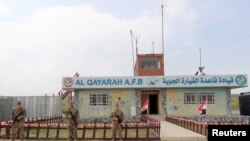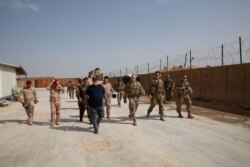Iran’s favorability rating among Iraqis has hit its lowest point in years, falling below the popular support the United States enjoys in the war-torn country, according to a new poll by an independent agency.
The poll, released Monday, was conducted by the Baghdad-based Independent Institute of Administration and Civil Society Studies (IIACSS), the Iraq representative of the Washington-based Gallup for polling.
“In general, Iraqis neither favor Iran nor the United States, but for the first time in a long time we see the favorability of the United States among Iraqis [being] double the favorability of Iran,” Munqith Dagher, president of IIACSS, said in a webinar hosted by the Washington Institute for Near East Policy.
“This is a new phenomenon in the Iraqi political theater,” he added.
Dagher, who is also a fellow at the Center for Strategic and International Studies, shared a breakdown of the results with VOA, showing that Iran’s favorability rating at only 15% while at least one third of Iraqis favored the U.S.
This is a sharp downturn for Iran from 2017 when it received a positive attitude from 70% of Iraqis, said Dagher.
Strategic Dialogue
The decline of Iraqi popular support for Iran comes at a time when the U.S. and Iraq have begun a new round of talks to redefine the future of their partnership beyond the war against the Islamic State (IS) terror group.
Dubbed “the Strategic Dialogue,” the first virtual round of negotiations took place last week. Following the meeting, a joint communique was issued, saying the U.S. withdraws some of its 5,000 troops that are stationed in Iraq and broadens its security-oriented partnership to include more cultural and economic cooperation with the oil-rich nation.
“The U.S. government, and I think this is support in a bipartisan way in the Congress, is looking also to morph the relationship away from a strictly security-driven one to a more and more sustainable one,” said Barbra Leaf, a former U.S. ambassador, during the webinar where the poll was announced.
Protecting US personnel
Ever since the January killing of powerful Iranian general Qassem Soleimani in a U.S. drone strike in Baghdad, Tehran has tried, through both its Iraq-based allies in the parliament and armed militia groups on the ground, to force American troops out of the country
Days after Soleimani’s death in January, Iraqi parliament passed a non-binding resolution to oust U.S. troops from Iraq.
The new U.S. deal with Iraq’s newly formed government, led by Prime Minister Mustafa al-Kadhimi, does not appear to satisfy the maximalist demands of Iran’s allies in Iraq who had pushed for a complete withdrawal of U.S. troops from their country or stripping the remainder of U.S. troops of their immunity from trial under local laws.
In the joint statement, Iraq recommitted to protecting the residual U.S. force and American diplomatic facilities; a vow that, some experts say, may prove harder to keep on the ground.
“Now comes the hard part,” said John Hannah, a senior Middle East analyst at the Foundation for the Defense of Democracies in Washington.
“What will Prime Minister Kadhimi actually do the next time one of the militias launch a major rocket attack against a U.S. facility? Actions, not words, will ultimately be the test of the commitments made on paper in the communique,” he told VOA.
Islamic State resurgence
Hannah also warned of risks involving a premature departure of a large number of U.S. troops from Iraq, where IS continues to pose a significant threat, especially in the country’s disputed territories in the north.
On Monday, an IS attack killed seven members of the Kakais, a non-Muslim Kurdish religious minority, according to local news reports. Kurdish officials accused Iraqi security forces of being “unable” to protect the Kurdish civilians in the disputed areas.
Raman Ghavami, a London-based counter-insurgency analyst, said recent events may push Iraq further away from Iran’s orbit.
“The timing of U.S.-Iraq dialogue is not in favor of Iran, neither its proxies,” he told VOA, adding that, “Months of protests in Iraq against Iran’s influence, mismanagement and corruption, an inevitable depression following COVID-19 pandemic, and Iran’s crippling economy which cannot offer any valuable support to Iraq have not left Baghdad with much space to dance further between U.S. and Tehran.”
Continued influence
Despite the decline in Iran’s favorability rating among Iraqis, some experts argue that Iran will remain an influential actor in Iraqi politics for the foreseeable future.
“Iran still has the ability to play kingmaker in Iraqi politics,” said Jason Brodsky, policy director of United Against Nuclear Iran, a U.S.-based advocacy group.
He told VOA that the Iranian government recently claimed reaching a two-year energy deal with Iraq as well as the building of a highway that would connect the Iranian city of Mehran to the holy city of Najaf in Iraq.
“While sanctions and Soleimani's demise have weakened Iran’s hand [in Iraq], Tehran continues to exert influence on the ground,” Brodsky said.





